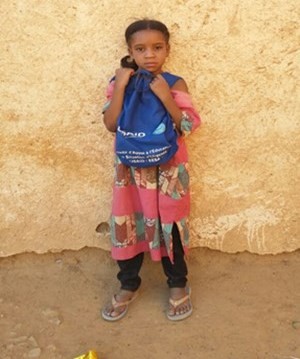Speeches Shim

January 2018—While 7-year-old Fatouma Walet Rhissa and other children happily jump rope and play football at school like all children their age, the teachers feel more motivated than ever because they have all the materials they need to teach well.
Despite the poverty and conflict around them, students grasp on to some sense of normalcy at the Baye Ag Mahaha school located in Mali’s Kidal region. In the northern regions of the country, many schools have been destroyed, closed or occupied by fighting factions. Kidal town recorded 264 students who had dropped out during the crisis. Their return to school motivates the entire community.
Over 50,000 Malian students have been displaced to the southern regions of the country, and more continue to flee from their northern homes.
Fatouma comes from an illiterate and poor family. As a first-year student, she started going to school without a pencil and a notebook since her parents could not afford school materials. In most areas of Kidal, there are children who do not have even these basic school supplies.
USAID’s Education Emergency Support Activity is designed to increase equitable access to basic education for children affected by the conflict in central and northern Mali and provide school kits to needy children. Schools also receive recreational equipment like skipping rope, whistles, and soccer and volley balls.
So far, more than 3,200 students from 25 schools in the Kidal region have received student kits. Like all the students from Baye Ag Mahaha school, Fatima got a backpack, notebooks, pens, pencils and erasers. It was the first time she wore a backpack.
“Today, I have everything I need to succeed during this school year. I am proud to look like other students,” Fatima said proudly.
“The kits and equipment our school received will increase our commitment as educators, and the determination of parents, students and the community to pursue education is the best way to secure a better future for our children, despite the conflict and the occupation of this territory,” said Pierre Traoré, director of the Baye Ag Mahaha school.
The Education Emergency Support Activity, which runs from 2016 through 2018, aims to reach 80,000 returned and resident learners in conflict-affected regions of Mali and to provide training to 1,500 teachers and 60 education administrators and officials. The program focuses on building and rehabilitating safe and functional learning spaces; providing students with remedial instruction to make up for years of schooling lost due to conflict; and improving community-led efforts to promote equity and prevent violence in and around schools.
LINKS
Follow @USAIDMali, on Facebook

Comment
Make a general inquiry or suggest an improvement.